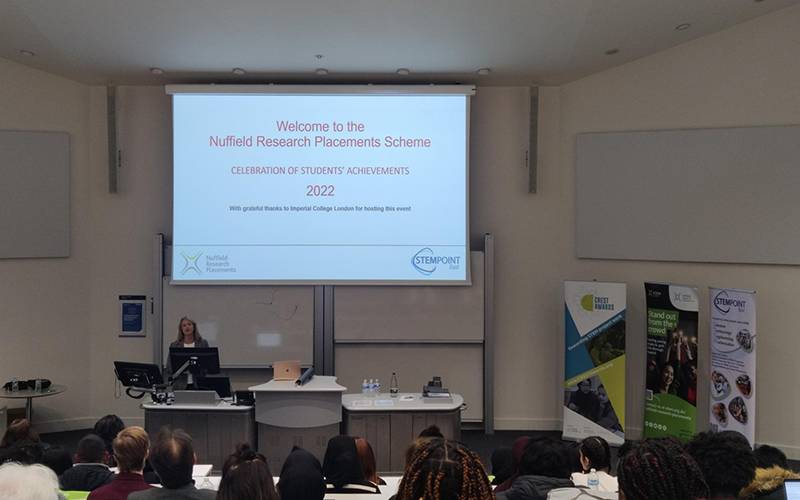In their own words: sixth form student research placements
16 November 2022
We were pleased to host another round of Nuffield Research Placements this summer. These placements give sixth form students an opportunity to develop research skills and experience working in a university environment.

This years’ students were Raoza Binte Helal and Luis Malcolm-Brown, supervised by Gesche Huebner, Nicole Watson, and Mike Fell. What better than to let the students themselves report on their experience – read on to find out more…
Raoza Binte Helal
For this project supervised by staff from UCL Energy Institute, another student and I focused on investigating the effects and consequences of overheating, noise and air pollution, and ways to minimise these with passive cooling methods in an office. We were tasked with researching overheating from articles and academic journals on the first day of the placement, which took place online. I feel this first day helped me practise extracting only the required information from a long, wordy piece of text: a skill very important for surviving university assignments. During our first in-person meeting with the staff, we were shown the equipment we would be using to measure temperature, CO2 levels, relative humidity, air quality and noise levels. My partner focused mainly on air quality, and I collected noise data instead. We were exposed to the many different variables that needed to be controlled in a real-world experiment, a skill we are not taught in school. When collecting data, we were required to use Microsoft Excel to download the reading from the equipment, calculate basic statistical values such as the mean, range, median, mode, standard deviation and perform statistical T-Tests. We also used Excel to represent our results visually using charts so they would be easier to interpret for others interested in the topic. During our second week, we delivered a presentation showing our results and analysis to a group of PhD students and tutors. This helped us receive constructive feedback on any flaws in our research design so we could apply this for any remaining data collection, and also our delivery and engagement with the audience.
Personally, I really enjoyed working with the staff in the facility as they were all very welcoming and friendly, and our supervisors were patient and engaged with us when we had any questions, and even gave us ideas for new variables to consider changing when collecting our data. The environment is calm, and everyone there is always focused and working when they need to be, which I found to be really motivating, and their work ethic is something I aspire to instil in myself.
My time in the facility wasn’t always just revolving around the project, however. For example, after our presentation, we had an informal chat with the students and professors present, where we could freely ask any questions about university life, career advice and writing CVs and personal statements. Our supervisors also took us on a tour around UCL’s main campus and showed us the Engineering Faculty, the main library, and the science library, amongst many others.
Overall, I greatly enjoyed this experience, and although it was not strictly an engineering placement, I believe it has taught me valuable skills in working on science in the real world, as well as interacting with others, and I have been able to gain an insight into a realistic reflection of student life and the flexibility of an undergraduate degree.
Luis Malcolm-Brown
For the first two weeks of the summer holidays, I was at UCL doing a research placement at the UCL Energy Institute researching the links between air pollution and temperature and to see how to lower air pollution in buildings and to find the best room to work in within the building I did my research. I collected my data each day at around 2.30 pm and collected data till 4pm. To be able to see how variables affect the air pollution and temperature, I opened the windows half way through, to see how air flow would affect the pollution and temperature. The sensors I would set up are an air quality sensory and temperature recorder in each room on different days. After collecting data for a week between these times, I found out that there was a direct link between air pollution and temperature and that the higher in the building you go, the higher the air pollution and temperature is, as after doing a T test between the top floor front facing room and ground floor front facing room the pollution and temperature was shown to be statistically significantly lower on the lower floors. In addition I found out that it is best to open the windows for at least 10 mins to reduce the pollution and temp and that in the building I was recording data in, the basement was the coolest and had the 2nd best air pollution after opening the windows

These Nuffield placements were organised by STEMPOINT East.
If you work for a school or company that it interested in supporting school engagement around topics relevant to sustainable built environments, please contact BSEER Outreach Lead Dr Mike Fell.
If you are a BSEER staff member or student who is interested in getting involved in Outreach and Widening Participation activities, please see the Intranet guidance.
We recently announced our new undergraduate degree, Sustainable Built Environments, Energy and Resources BSc and MEng, which will launch in 2023. Both courses recognise and respond to the important role UCL will have to play in giving the professionals of tomorrow the expertise they need to manage the developing climate and biodiversity crisis.
 Close
Close

